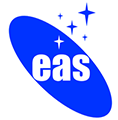Outstanding Research Awarded by the German Astronomical Society
The German Astronomical Society (AG), the German national professional association for astronomy and astrophysics, announces the award winners for 2023: Thomas Henning is honoured with the Schwarzschild Medal, Frank Eisenhauer receives the Instrument Development Award, the Ludwig Biermann Award goes to Dominika Wylezalek, Annika Rudolph receives the Doctoral Thesis Award, Maximilian Alt the Jugend-forscht special prize, and Felicitas Mokler the Roelin Award for Science Journalism.
Professor Thomas Henning, director at the Max Planck Institute for Astronomy (MPIA) in Heidelberg, receives the most prestigious award of the German Astronomical Society, the Karl Schwarzschild Medal, for his outstanding contributions in the field of star and planet formation. His broad research profile is reflected in his theoretical work, laboratory experiments, observational studies, and numerous collaborations. Furthermore, he uniquely combined studies of dust formation in the interstellar medium with laboratory experiments. With his team, he built instruments for Earth-based telescopes and infrared instruments for space, including JWST. His achievements range from impressive observations of protoplanetary disks and their structure to the discovery of young planets in the disks around stars. He also made important contributions to the understanding of prebiotic chemistry. Thomas Henning received his PhD in Jena, where he later established a laboratory astrophysics group and was director of the Astrophysical Institute and the University Observatory. Since 2001, he has been director of the Planet and Star Formation department at MPIA, is Honorary Professor at Heidelberg University and Professor for Astrophysics at the University of Jena.
Professor Frank Eisenhauer, director at the Max Planck Institute for Extraterrestrial Physics (MPE), is honoured with the 2023 Instrument Development Award for his outstanding contributions to the development of innovative complex infrared instruments for ground-based telescopes. In addition to his experimental work, he has conducted fundamental astrophysical research with these instruments. His technical innovations allowed high-precision measurements that led to numerous publications and the 2020 Nobel Prize in Physics. Already during his diploma and PhD thesis in Munich he was involved in the development of instruments for astronomical telescopes. With SINFONI and GRAVITY he successfully developed and led two pioneering international experiments, and has received several awards for his research and instrumentation projects.
With the Ludwig-Biermann-Award, the AG honours Dominika Wylezalek, leader of a DFG Emmy-Noether Junior Research Group at the Center for Astronomy/ Astronomisches Rechen-Institut of Heidelberg University, for her research achievements in the field of galaxy and massive black hole evolution. Using specially developed analysis methods and spectroscopic observations, she is investigating how active galactic nuclei with supermassive black holes influence the evolution of their home galaxies and their galactic environment. Dominika Wylezalek received her PhD from Munich University (LMU) / ESO Garching in 2014. She then moved to Johns Hopkins University, Baltimore, USA. In 2017 she moved back to Munich as an ESO fellow before starting her research group in Heidelberg in 2020.
For her work on high-energy astrophysical phenomena like Gamma-Ray Bursts though numerical modeling, making multi-messenger predictions testable against observations, the AG awards the Doctoral Thesis Prize to Annika Rudolph, now postdoc at the Niels Bohr institute in Copenhagen. Her PhD project titled “Emission of Multiple Messengers from Gamma-Ray Bursts” was performed at the Humboldt University of Berlin and DESY Zeuthen, and defended in 2022 with overall grade summa cum laude. Her thesis explores whether Gamma-Ray Bursts could be sources of Ultra-High-Energy Cosmic Rays. The tools developed by Annika Rudolph allow predictions over a very broad spectral range and also for neutrinos.
Maximilian Alt from the Johannes-Gymnasium in Lahnstein, receives a special prize from the AG for the best work in the field of astronomy in the national competition "Jugend forscht" (youth's research). In his research project, he studied the expansion of the universe and determined the value of the Hubble constant based on observations of type 1a supernovae explosions. For this purpose, the young researcher evaluated the data from various large telescopes and also recorded his own spectra in an observatory in the Eifel region. In this way, he obtained an amazingly accurate value for the Hubble constant.
In addition, the Max Planck Institute for Astronomy Heidelberg (MPIA) will award the Hanno and Ruth Roelin Prize for Science Journalism at the AG meeting. This year, the award goes to Dr. Felicitas Mokler from the Max Planck Institute for Radio Astronomy in Bonn. She works as a freelance journalist for the magazine "Die Weltraumreporter" (The Space Reporters), which she founded, as well as for media such as Spektrum der Wissenschaft, Neue Zürcher Zeitung and FAZ, and wrote the remarkable books "Astronomie und Universum" (Astronomy and the Universe), "Die Evolution des Universums" (The Evolution of the Universe) and, together with Robert Schwarz, "Unter den Polarlichtern der Antarktis" (Under the Aurora Borealis of Antarctica).
The award ceremonies will take place during the annual meeting of the German Astronomical Society in Berlin from September 11-15, 2023.
Awards of the AG: https://www.astronomische-gesellschaft.de/en/activities/awards
Contact: Janine Fohlmeister (Press officer of the German Astronomical Society)
Phone: +49 / (0) 331 / 7499-802




